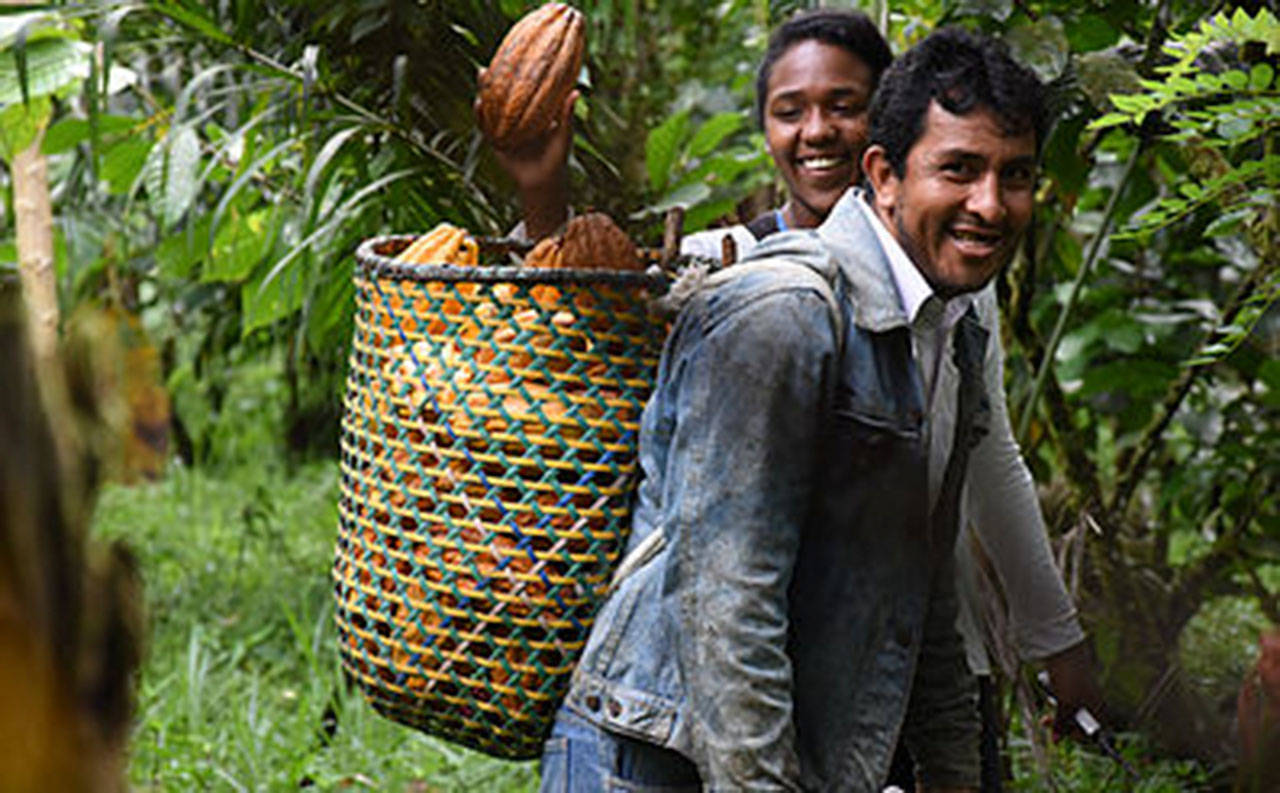Free chocolate.
Now that I have your attention…
Craft chocolate pioneer and chocoholic scholar Lauren Adler, founder/owner of the iconic Seattle chocolate shop Chocolopolis, will visit The Traveler at 7 p.m. Tuesday, June 18 to discuss Ecuador’s exciting and unique historical and modern connection to the world chocolate industry — a tasty talk complete with samples.
The free presentation is the latest in a series of guest travelogues hosted by the downtown Winslow shop (256 Winslow Way East) called Tuesdays at The Traveler — and also the most delicious — and will include a preview of an upcoming chocolate expedition that Adler is leading through Global Family Travels.
“I think it’s going to be a great presentation,” said Traveler spokeswoman Kathy Irvin. “[It’s] such an interesting subject; and the bonus of a chocolate tasting.”
Now, even chocolate aficionados in the know may be excused for not thinking of Ecuador first when considering their favorite treat in more serious terms than s’mores and kisses. According to www.makechocolatefair.org, “[Seventy percent] of the world’s cocoa beans come from four West African countries: Ivory Coast [Côte d’Ivoire], Ghana, Nigeria and Cameroon.”
But Ecuador is well worth investigating. According to Adler, it boasts a unique position in the chocolate world, a surprisingly relevant history, and also a very promising future.
Though the question of cacao’s origins had long been uncertain, recently science came through and revealed the comparatively small South American country to bee a more pivotal place than first believed.
“In 2008, when I opened, the USDA [U.S. Department of Agriculture] and MARS [Market Analysis and Reporting Services] started this cacao genome project and they started genotyping cacao DNA … [and] one of the things they figured out was that genetically cacao is native to the Amazon river basin, and it’s like right where Ecuador and Peru are and the Amazon River,” Adler said.
Ecuador also is renowned for being home to the most productive cacao varietal on Earth, Adler said.
“Not only does it have an ancient cacao tradition that dates back centuries, but it’s also home to a vibrant, modern craft chocolate scene that offers excellent cacao and chocolate to taste,” explained the chocolate expert.
And how exactly does one become a chocolate expert anyway?
Sounds like a sweet gig, right?
“It’s a nice field to be in,” Adler laughed. “I’d been in the corporate world and I always wanted to have my own specialty food store. I love food. I love travel. I love things that are international.”
Given all that, chocolate may seem like a natural choice today, but things were a lot different back in the comparatively primitive candy culture of 2008.
“When I opened there were five American craft chocolate makers, Theo being one of them,” Adler said. “Most of them had opened or started about a year or two before we opened, and so there weren’t very many people who were roasting cacao in small batches and making single-origin dark chocolate.
“And now, fast forward over a decade later, and there are over 200 in the U.S., there’s probably about 300 or 400 now, and there are like 500 internationally. Everybody wants to make chocolate from the bean.”
Even during the dearth, however, the sugary saga of chocolate was one that captivated Adler.
“I fell in love with the story of cacao and chocolate because it is so rich with experience … here’s history, there’s farming, there’s agriculture and production, there’s socioeconomic and political issues — there’s just so much to dig your teeth into,” she said. “And whatever I’ve done in my past life, one of the things that I’m very good at is educating and setting context and helping audiences of different types understand a topic that can be very complex.”
Adler will be taking an out-of-classroom (and out-of-the-shop) approach to educating the curious later this year when she hosts a chocolate-centric expedition to Ecuador, a travel opportunity she will also discuss during her Traveler presentation.
The trip, slated to leave in September, is timed to coincide with the annual cacao harvest, Adler said, so participants will learn about cacao growing and chocolate making from passionate farmers who are committed to preserving Ecuador’s renowned “nacional” cacao varietal.
“It was known for this one varietal that was very prized,” Adler said. “When the USDA did it’s cacao genome project the nacional was the first one that … became it’s own type. There’s not much true nacional left, and in fact they weren’t sure there was any but one of the places we’re … having a chocolate tasting in Ecuador is [with] this company called To’ak … They sell the most expensive chocolate in the world.”
When their trees were typed by the USDA, To’ak was found to have nine of the prized, rare nacional varietal.
Yes, you may be thinking, that’s all well and good and interesting — but how does it taste?
For the discerning sweet tooth, Adler says it may well be worth the price tag (though she has not yet tasted it herself).
“A lot of Ecuador [chocolate] is both floral and fruity,” Adler said. “It will have sort of these green grass and kind of cream notes. It doesn’t tend to be what people would think of as chocolatey.”
The trip’s itinerary will also factor in time to explore cacao production around the country, and will feature private tours and tastings at top-tier craft chocolate companies and shops in and around Quito, the capital city.



